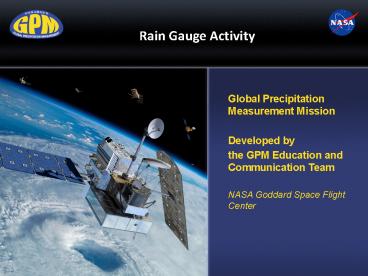Rain Gauge Activity - PowerPoint PPT Presentation
Title:
Rain Gauge Activity
Description:
Rain Gauge Activity Global Precipitation Measurement Mission Developed by the GPM Education and Communication Team NASA Goddard Space Flight Center – PowerPoint PPT presentation
Number of Views:73
Avg rating:3.0/5.0
Title: Rain Gauge Activity
1
Rain Gauge Activity
- Global Precipitation Measurement Mission
- Developed by
- the GPM Education and Communication Team
- NASA Goddard Space Flight Center
2
Guiding Questions
- The Big Picture Why is it important to measure
rain and snow around the globe? - Earths Water How much of Earths water is
freshwater? - Freshwater versus Saltwater Which of these do
we need for our survival? - The Water Cycle How does water move through the
water cycle? - Precipitation Where do rain and snow come from?
Are these made up of freshwater or saltwater? - Making a Rain Gauge to Measure Rain Can we make
a rain gauge that we can use to measure rain in
our area? - GPM How will the GPM mission measure
precipitation all over the world?
3
ENGAGE
4
Solid? Liquid? Gas?
5
Saltwater versus Freshwater
6
How much of Earths water is fresh water?
1. Fill the plastic cup 75 full of water. This
represents the amount of water on Earths surface.
2. Take out one dropper of water, and place it in
the small cup. This represents the amount of
fresh water on Earth. (2.5)
3. Take one drop of water from the small
cup. This represents, the amount of accessible
freshwater.
Not much water, is it!
7
Earths Water Cycle
The Water Cycle animation from NASA/GSFC SVS
10501
8
The Big Picture
9
Measuring Rain
- Lets make rain gauges. These are used to measure
how much it rains in a specific place. - Work with a partner, and use the materials on the
table to try to make something that you could use
to measure how much rains falls in one day.
10
Design Considerations
- What did you find difficult about this task?
- Which design do you think would be the most
effective for measuring precipitation? - Why?
- What are some design factors that you think are
important to have consistent for the rain gauges? - Why?
- What could you do to improve your rain gauge?
11
For Good Measure
12
- Extra
Slides - - If you have time to go outside and simulate
rain and have students collect data, you can use
the next slide to have them share in data and
compare it.
13
Group Rain Data
Groups Group 1 Group 2 Group 3 Group 4 Group 5 Group 6
Amount of rain
14
Discussion
- What did we notice about our data?
- What might we change next time to collect more
accurate data? - How do you think scientists collect data on how
much rain falls around the world?































